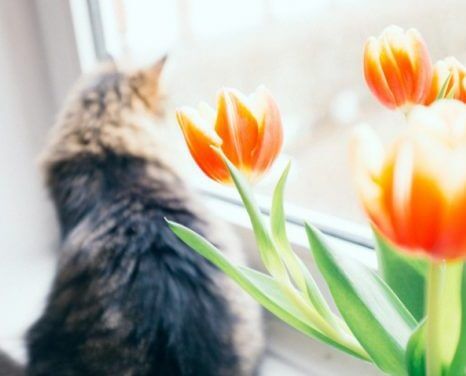10 Common Household Hazards for Cats

Cats have a powerful sense of smell and a very particular palate. But because they self groom, they will ingest substances on their paws and fur that they would normally avoid. Keeping your home cat proof is compulsory for the cat guardian. Over time, it’s natural that things slip. Perform a regular sweep of your home and habits to protect your cat from these 10 common household hazards for cats.
In emergencies, call Australian Animal Poisons on 1300 869 738.
1. Human Food
Dairy – anything containing lactose will upset your cat’s stomach. Try a lactose-free milk formulated for cats.
Onions – anything from the lily family, which includes chives, shallots, leeks and garlic, as well as the flowering lily plant.
Alcohol – effects are much more extreme on cats than humans, such as liver and brain damage.
Grapes – including raisins and sultanas. Ingestion can lead to kidney failure, particularly in cats with pre-existing renal disease. Grapes are also highly toxic for dogs.
Caffeine – coffee, tea, chocolate, coke and energy drinks. Caffeine affects a cat’s heart.
Chocolate – as well as caffeine, chocolate also contains theobromine, which is also harmful for cats’ hearts.
2. Human Medication
A small and light weight pill packet is an ideal cat toy, and a common cause of toxicity in cats. Aspirin, ibuprofen and naproxen are particularly dangerous, causing stomach ulcers and kidney failure. Cold and flu tablets containing acetaminophen are also lethal to cats.
3. Dental Floss, Cotton Thread, Cooking Twine
Anything in the form of string is a hazard to your cat. Cats, especially kittens, love playing with balls of wool, and string. If ingested, it can cause intestinal damage, requiring surgery for removal.
4. Insecticides and Rodenticides
Rat bait and insecticides are designed to attract these pests. But they are also attractive to cats. Ingestion is life threatening; take your cat immediately to your veterinarian for emergency treatment.
5. Flea Control
Flea control products containing permethrin are dangerous for cats. Found mostly in flea treatment for dogs, a cat can absorb the deadly toxin through grooming a dog recently treated with a topical permethrin product. Even sleeping next to a treated dog risks transference of the toxin, which a cat will ingest when self grooming. Find an alternative flea treatment for your pooch if they’re snuggle pals with your cat.
6. Flowers and Plants
Lilies are a danger for cats; even the pollen is highly toxic. Ingestion can result in kidney failure. Other dangerous flowers and plants include tulips, amaryllis, baby’s breath, hydrangeas and philodendrons. Poinsettias and holly, popular at Christmas, must also be avoided. Ingestion causes vomiting and gastrointestinal upset, and can be fatal.
7. Household Cleaners
A cat that walks upon a freshly cleaned floor or other surface will ingest detergents, bleach and disinfectants. Take care to confine your cat until the surface has dried. Your kitty cat will absorb these substances from licking their paws.
8. Ironing Boards
Cats love elevated surfaces, and an ironing board is the perfect perch. However, ironing boards can be rickety, and coupled with a hot iron means double trouble for your cat. Keep your ironing board folded and put away, or out of reach.
9. Plastic Bags
Cats love to hide in small spaces, and a plastic bag may appeal. As with children, keep plastic bags out of reach of your kitty; they can cause suffocation.
10. Toilet Water
Cats do some strange things, and it isn’t unusual to find one perfectly balanced on the rim of a toilet for a drink. Apart from the danger if ingesting faecal matter, toilets with a cleanser cake in-cistern or attached to the rim contain dangerous chemicals. Always keep the toilet lid closed.
Overall, we know that cats won’t eat just anything. But many of these common household hazards may be ingested through grooming. If you are a new cat guardian, read Prepare Your Home for a New Cat. Keep your home cat proof, keep your kitty safe and you’ll enjoy many long and healthy years together.
Australian Animal Poisons Hotline 1300 869 738
